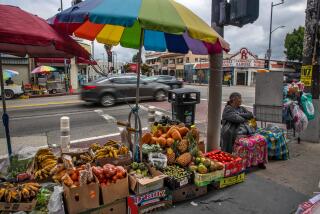Market Watch: A new tack in farmers market regulation
A plan earlier this year to ensure the integrity of farmers markets went nowhere, but now the California Department of Food and Agriculture is forming an advisory group to consider a variety of topics related to the direct marketing of fruits and vegetables — not only farmers markets but also farm stands and community-supported agriculture (CSA) programs.
Last week California Secretary of Agriculture Karen Ross sent out 21 letters to people inviting them to join a Direct Marketing task force. The group, which includes members from a range of agriculture-related organizations, will meet monthly starting in early October. A report with their recommendations should be ready by July.
According to Rick Jensen, director of Inspection Services for the CDFA, the committee will be looking at a wide variety of direct-marketing topics, including the possibility of improving access to fresh fruits and vegetables in so-called food deserts that are under-served by regular markets, as well as developing possible new direct-marketing regulations and finding ways to fund, support and enforce them. The group may also consider topics such as whether the term “locally grown” needs to be legally defined, whether to define CSAs in law and whether farmers at markets should continue to be allowed to sell produce to restaurants and distributors.
Meanwhile, a bill that extends the CDFA’s supervision of the state’s certified farmers market program, SB 513, awaits signing on the desk of Gov. Jerry Brown. He has until Oct. 9 to sign this bill, which extends the state-certified farmers market program, which is facing “sunset” at the end of 2011. Previous extensions of the program’s authority were for periods of five years, but the bill’s sponsor, Sen. Anthony Cannella (R-Ceres), amended it to shorten this term to two years (through 2013) in order to encourage the farmers market industry to develop an integrity plan during that time.
In the unlikely event that Brown were to veto the bill, certified farmers markets would continue to exist in California, but the state’s supervision of the program would cease, says Jensen. That would include funding and coordination of the Certified Farmers Market Advisory Committee, state enforcement activities and civil penalties for violations of market rules.
Last autumn, in the aftermath of media reports alleging cheating by vendors at Southern California certified farmers markets (including selling of purchased produce and misrepresentation of conventional produce as unsprayed or organic), the CDFA held public listening sessions and appointed a technical planning committee, which offered a farmers market integrity plan last March. This plan proposed to fund enforcement by raising the cap on the fee paid by farmers each time they sell at a farmers market, from the current 60 cents per market to as much as $4.
If the maximum fee had been adopted, it would have raised approximately $1.5 million to hire additional state inspectors, boosted funding for county inspections, and developed a training program for managers, as well as enforcement-related databases.
Although many Southern California farmers market managers and stakeholders supported the plan, other industry participants around the state thought it was too expensive or would not result in effective enforcement. Raising fees of any sort is particularly problematic in the current political environment, and because of the lack of consensus in the farmers market industry, Cannella did not include language increasing the fee in the bill.
One of the most potentially significant items in Jensen’s brief of the direct-marketing task force’s purview is “determining whether buying and reselling is an acceptable method of direct marketing.” The exact meaning of this phrase is unclear, but Noelle Cremers, a governmental affairs director at the California Farm Bureau Federation and a member of the direct-marketing task force, says that a representative of agricultural interests, whom she declined to name, wanted to reexamine whether farmers at certified farmers markets should continue to be allowed to sell to restaurants and food-service purveyors. (This technically was not allowed until 2008.)
The task force is expected to address the farmers market integrity issue, although it is not clear what new ideas will be brought to the table. As one possible alternative to the technical planning committee’s enforcement plan, Leah Smith, director of programs at the Agricultural Institute of Marin, has suggested that third-party organizations, similar to the agencies that inspect organic growers, might be able to certify farmers market vendors. Such agencies might be able to do the job at a lower cost than the CDFA and county employees, she said.
Currently only the CDFA has the statewide power to gather information about market vendors’ production and sales and to penalize violators of market rules. Redrawing the basic structure of farmers market enforcement would require a lot of heavy lifting in terms of legislative change. Also, because county agricultural commissioners have the primary responsibility for enforcement but lack adequate resources to do the job, any realistic integrity plan will have to address that shortfall.
Partly in frustration at the lack of effective state and country enforcement, several groups of market operators recently have beefed up their own farm audit programs. Agricultural Institute of Marin, which runs eight certified farmers markets, employs 11/2 staff members for its program, which involves an unannounced inspection of a farmer’s stand at the market, closely followed by a visit to the farm. Of the approximately 65 vendors surveyed so far, the great majority appeared to be honest, AIM’s Smith said, but two have been removed for selling purchased produced.
Such a locally based program has the potential to be nimble and effective, but in Southern California, competing groups of farmers market operators do not always share information about production and sales that is needed to catch cheaters. Moreover, customers of small independent farmers markets, which often lack the resources for inspections, would not benefit from such an approach.
Farmers market integrity issues have been studied and debated by industry organizations for more than a decade, and so far conflicting opinions have doomed attempts to boost statewide enforcement. Typically, a lot gets discussed but nothing happens. It remains to be seen if the task force will find a way forward through the morass of farmers market politics.
More to Read
Eat your way across L.A.
Get our weekly Tasting Notes newsletter for reviews, news and more.
You may occasionally receive promotional content from the Los Angeles Times.






